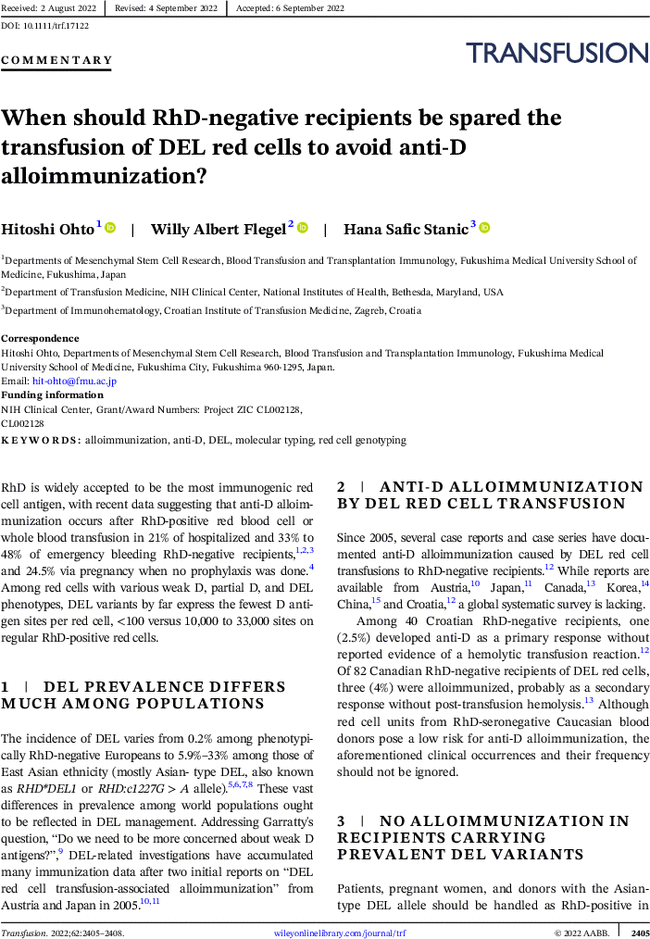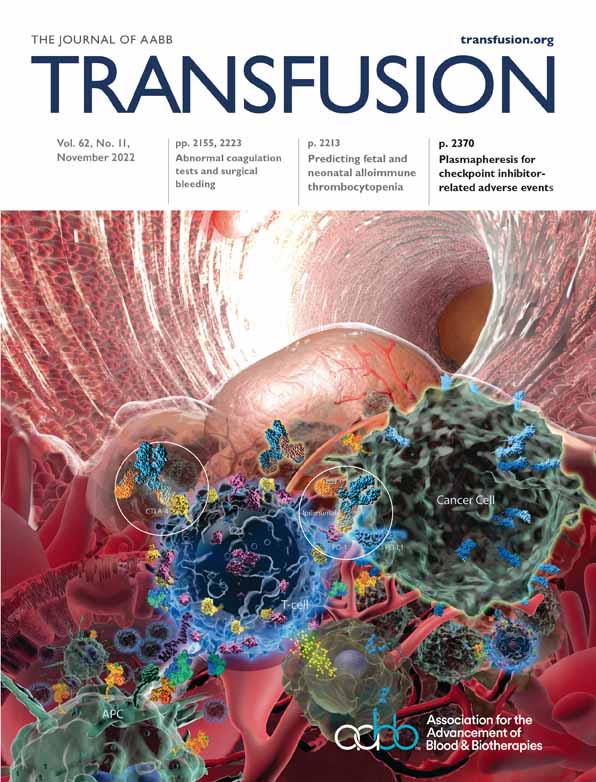When should RhD-negative recipients be spared the transfusion of DEL red cells to avoid anti-D alloimmunization?
Corresponding Author
Hitoshi Ohto
Departments of Mesenchymal Stem Cell Research, Blood Transfusion and Transplantation Immunology, Fukushima Medical University School of Medicine, Fukushima, Japan
Correspondence
Hitoshi Ohto, Departments of Mesenchymal Stem Cell Research, Blood Transfusion and Transplantation Immunology, Fukushima Medical University School of Medicine, Fukushima City, Fukushima 960-1295, Japan.
Email: [email protected]
Search for more papers by this authorWilly Albert Flegel
Department of Transfusion Medicine, NIH Clinical Center, National Institutes of Health, Bethesda, Maryland, USA
Search for more papers by this authorHana Safic Stanic
Department of Immunohematology, Croatian Institute of Transfusion Medicine, Zagreb, Croatia
Search for more papers by this authorCorresponding Author
Hitoshi Ohto
Departments of Mesenchymal Stem Cell Research, Blood Transfusion and Transplantation Immunology, Fukushima Medical University School of Medicine, Fukushima, Japan
Correspondence
Hitoshi Ohto, Departments of Mesenchymal Stem Cell Research, Blood Transfusion and Transplantation Immunology, Fukushima Medical University School of Medicine, Fukushima City, Fukushima 960-1295, Japan.
Email: [email protected]
Search for more papers by this authorWilly Albert Flegel
Department of Transfusion Medicine, NIH Clinical Center, National Institutes of Health, Bethesda, Maryland, USA
Search for more papers by this authorHana Safic Stanic
Department of Immunohematology, Croatian Institute of Transfusion Medicine, Zagreb, Croatia
Search for more papers by this authorFunding information: NIH Clinical Center, Grant/Award Numbers: Project ZIC CL002128, CL002128

CONFLICT OF INTEREST
HO is a member of the “Department of Mesenchymal Stem Cell Research,” which is endowed by Alfresa Corporation. The other authors declare no conflict of interest.
REFERENCES
- 1Seheult JN, Callum J, Delaney M, Drake R, Dunbar NM, Harm SK, et al. Rate of D-alloimmunization in trauma does not depend on the number of RhD-positive units transfused: the BEST collaborative study. Transfusion 2022; 62(Suppl 1):s185-92.
- 2Flegel WA, Wagner FF, Donghaile DPÓ. Anti-D immunization rates may exceed 50% in many clinically relevant settings, despite varying widely among patient cohorts. Transfusion. 2020; 60: 1109–10.
- 3Yazer MH, Delaney M, Doughty H, Dunbar NM, Riyami AZ, Triulzi DJ, et al. It is time to reconsider the risks of transfusing RhD negative females of childbearing potential with RhD positive red blood cells in bleeding emergencies. Transfusion. 2019; 59: 3794–9.
- 4Shao C-P. Transfusion of RhD-positive blood in “Asia type” DEL recipients. N Engl J Med. 2010; 362: 472–3.
- 5Flegel WA, von Zabern I, Wagner FF. Six years' experience performing RHD genotyping to confirm D- red blood cell units in Germany for preventing anti-D immunizations. Transfusion. 2009; 49: 465–71.
- 6Ito S, Ohto H, Ogiyama Y, Irino M, Omokawa S, Shibasaki I, et al. A practical and effective strategy in East Asia to prevent anti-D alloimmunization in patients by C/c phenotyping of serologic RhD-negative blood donors. eJHaem. 2021; 2: 750–6.
- 7Thongbutt J, Laengsri V, Raud L, Promwong C, Ayudhya C, Férec C, et al. Nation-wide investigation of RHD variants in Thai blood donors: impact for molecular diagnostics. Transfusion. 2021; 61: 931–8.
- 8Yin Q, Flegel WA. DEL in China: the D antigen among serologic RhD-negative individuals. J Transl Med. 2021; 19: 439.
- 9Garratty G. Do we need to be more concerned about weak D antigen? Transfusion. 2005; 45: 1457–1.
- 10Wagner T, Körmöczi GF, Buchata C, Vadon M, Lanzer G, Mayr WR, et al. Anti-D immunization by Del red blood cells. Transfusion. 2005; 45: 520–6.
- 11Yasuda H, Ohto H, Sakuma S, Ishikawa Y. Secondary anti-D immunization by Del red blood cells. Transfusion. 2005; 45: 1581–4.
- 12Safic Stanic H, Dogic V, Bingulac-Popvic J, Galic ZK, Vidovic MS, Puljic K, et al. RhD alloimmunization by DEL variant missed in donor testing. Transfusion. 2022; 62: 1044–88.
- 13St-Louis M, Lebrun A, Goldman M, Lavoie M. Alloimmunization of patients by blood units harboring distinct DEL variants. Immunohematology. 2013; 29: 136–40.
- 14Kim K-H, Kim K-E, Woo K-S, Han J-Y, Kim J-M, Park KU. Primary anti-D immunization by DEL red blood cells. Korean J Lab Med. 2009; 29: 361–5.
- 15Shao CP, Wang BY, Ye SH, Zhang WL, Xu H, Zhuang NB, et al. DEL RBC transfusion should be avoided in particular blood recipient in East Asia due to allosensitization and ineffectiveness. J Zhejiang Univ Sci B. 2012; 13: 913–8.
- 16Flegel WA, von Zabern I, Wagner FF. Six years' experience performing RHD genotyping to confirm D- red blood cell units in Germany for preventing anti-D immunizations. Transfusion. 2009; 49: 465–71.
- 17Gowland P, Gassner C, Hustinx H, Stolz M, Gottschalk J, Tissot JD, et al. Molecular RHD screening of RhD negative donors can replace standard serological testing for RhD negative donors. Transfus Apher Sci. 2014; 50: 163–8.
- 18Flegel WA. Modern rhesus (Rh) typing in transfusion and pregnancy. CMAJ. 2021; 193: E124.
- 19Luken JS, Ritsema SP, Van der Wal MM, van der Schoot CE, Rouwette EAJA, de Haas M, et al. Mapping anticipated advantages and disadvantages of implementation of extensive donor genotyping: a focus group approach. Transfus Med. 2022; 1–9. doi:10.1111/tme.12887
- 20Flegel WA, Gottschall JL, Denomme GA. Integration of red cell genotyping into the blood supply chain: a population-based study. Lancet Haematol. 2015; 2: e282–9.
- 21Flegel WA, Gottschall JJ, Denomme GA. Implementing mass-scale red cell genotyping at a blood center. Transfusion. 2015; 55: 2610–5.
- 22Crottet SL, Henny C, Meyer S, Still F, Stolz M, Gottschalk J, et al. Implementation of a mandatory donor RHD screening in Switzerland. Transfus Apher Sci. 2014; 50: 169–74.
- 23Wagner FF. RHD PCR of D-negative blood donors. Transfus Med Hemother. 2013; 40: 172–81.
- 24Takahashi M, Ito S, Ogiyama Y, Asano T, Hishinuma T, Kagaya H, et al. Wide-area management of the blood Services in Japan makes a detection of rare blood group donors more efficiently. Ketsueki Jigyou. 2015; 38: 687–93.
- 25Körmöczi GF, Gassner C, Shao C-P, Uchikawa M, Legler TJ. A comprehensive analysis of DEL types: partial DEL individuals are prone to anti-D alloimmunization. Transfusion. 2005; 45: 1561–7.
- 26 (ISBT 004) RHD blood group alleles v6.1.31-MAR-2022. https://www.isbtweb.org/isbt-working-parties/rcibgt/blood-group-allele-tables.html
- 27Turley E, McGowan EC, Hyland CA, Schoeman EM, Flower RL, Skoll A, et al. Severe hemolytic disease of the fetus and newborn due to Allo-anti-D in a patient with a partial DEL phenotype arising from the variant allele described as RHD*148+1T (RHD*01EL.31). Transfusion. 2018; 58: 2260–4.
- 28Wang M, Wang BL, Xu W, Fan DD, Peng ML, Pan J, et al. Anti-D alloimmunisation in pregnant women with DEL phenotype in China. Transfus Med. 2015; 25: 163–9.




